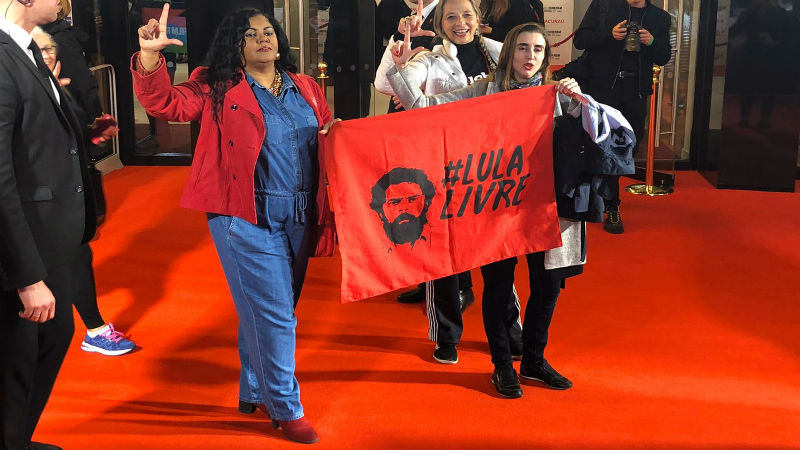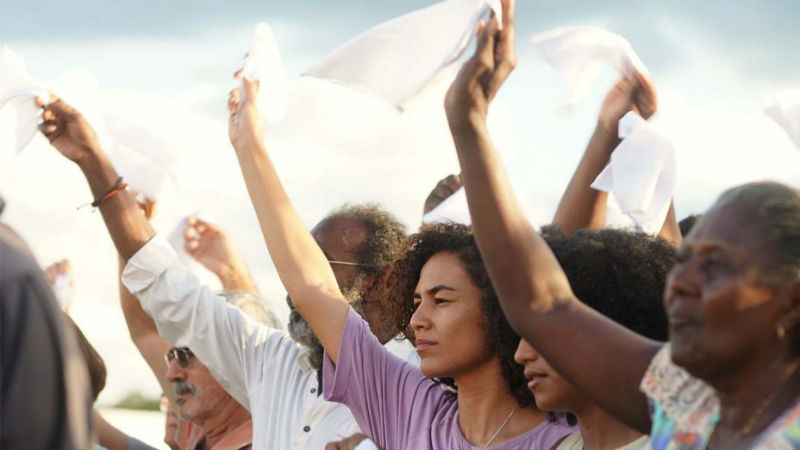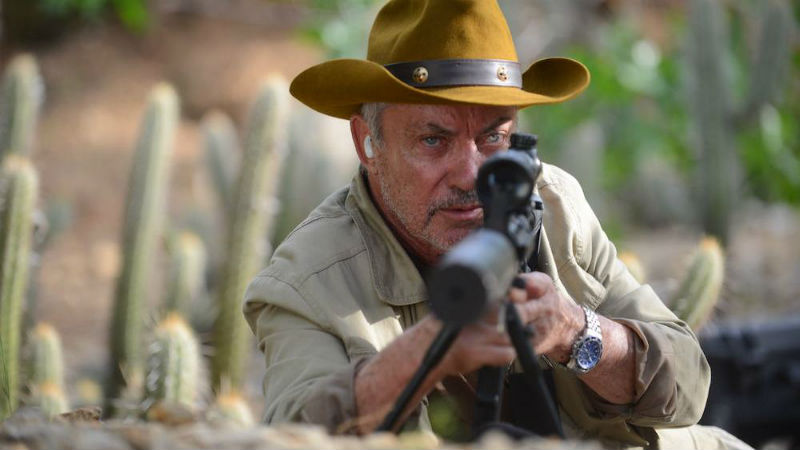A little town in the arid hinterlands of Northeastern Brazil has been erased from the map. Literally. Locals can no longer locate it on the various online applications. Someone (or something?) is killing the locals. There have been seven murders in one day. Small UFOs monitor the town from above. The locals are prepared to fight back for their survival. They also wish to protect their their identity and cultural heritage.
The fictional struggle depicted in Kleber Mendonca Filho and Juliano Dornelles’s Bacurau has come to symbolise the very real struggle that Brazil is experiencing at present, as the country grapples with a profoundly authoritarian and obscurantist government. Bolsonaro has vowed to eradicate left wing ideologies, and he’s currently attempting to implement measures that are tantamount to censorship.
Bacurau premiered at the BFI London Film Festival to a lot of glitz and glam, on a Friday night red carpet gala event. Kleber and Juliano delivered a passionate speech, explaining that Brazilian artists and culture are being demonised. Meanwhile, Brazilian activists demonstrated on the red carpet, asking for Lula’s freedom [pictured below]. The highly popular left wing leader and former Brazilian president is currently a political prisoner.

Our editor Victor Fraga (who’s also Brazilian) sat down with Kleber and Juliano the following day. They talked about the state of Brazilian cinema, censorship, the armed struggle, movie genres, the role of the Brazilian Northeast in the resistance and much more!
…
.
Victor Fraga – Bacurau won the Jury Ex-Aequo Prize in Cannes, a brand new achievement for Brazilian cinema. Karim Ainouz’s The Invisible Life of Euridice Gusmao also won a novel prize, the Un Certain Regards. Could you please talk about the significance of this double achievement, particularly in the light Brazil’s obscurantist and anti-culture government?
Juliano Dornelles – We are currently experiencing what’s perhaps the most important moment in the history of Brazilian cinema. That’s thanks to two things. First of all, the decentralisation of cinema, which moved away from the Rio de Janeiro/Sao Paulo axis, and started being produced in other states and regions. Secondly, there are more ways to make films thanks to technology developments. That said, we have been making films for many years, in my home state of Pernambuco, in the states of Ceara, Rio Grande do Sul, Minas Gerais, plus of course Sao Paulo and Rio de Janeiro.
And then this awful situation happens. The new government extinguished the Ministry of Culture in its first day in office. Plus he started talking about censorship as if that was a reality, but it’s not, because the Brazilian constitution establishes that it does not exist. These prizes mean that we have a lot of visibility, and the interest in Brazilian culture grows, impacting our pride and self-esteem.
Kleber Mendonca Filho – This is indeed the best moment that Brazilian cinema has ever experienced. When two films win memorable, historical prizes in Cannes. In the same year, it has a massive presence in Rotterdam, Berlin and Locarno. The newly-elected far-right government, however, decides to go in the opposite direction, destroying this very careful construction of Brazilian culture. We have been working for 15 years in a very democratic fashion in terms of filmmaking, with new policies which see funding being shared in a fair way, geographically speaking. There are more films being made in places where they were never made before, such as Pernambuco. We did not have a film community in our state 25 years. We had a few sparse productions. And of course Ceara and Minas Gerais. Right now we have an amazing moment that’s being basically deconstructed and destroyed, and that’s very sad.
VF – The Wild Wild West helped to define American counterculture. Will the Wild Wild Northeast define Brazilian counterculture? Is there a parallel?
KMF – The Brazilian Northeast has always defined Brazilian culture. It’s the very structure of Brazilian literature, cinema and music. The history of the Northeast explains a lot of what we do in Brazil. So it’s only natural that we should now come full circle with a film where most of the crew come from the Northeast, particularly from the state of Pernambuco. It’s not really a film about the Northeast, but it has a very strong social flavour and the historical aesthetics of the region. It’s interacting in such an amazing fashion with Brazil as a country, a nation and a society. The film has become a part of the conversation. It has become a mean. It’s a moment that we witness in awe, and that’s the most beautiful thing that can happen to us.

We share with the US many notions of landscape and of occupying the landscape. And that of course includes a lot of violence. Plus we are all Americans, we come from the Americas. The American West is known for its violence, and the genocide of the indigenous populations. And that’s also happening in Brazil. We just came from New York and the reactions to the film was astounding. There’s a very clear parallel. It’s like the mirror image.
VF – Locals have to resort to extreme violence in order to resist against colonialism and other reactionary forces. Do you believe in the armed struggle as a resistance weapon?
JD – I think that any person deserves respect as a human being. There are limits to your survival, to your life. Bacurau is just a film. I’m not in favour of violence. I don’t think that’s the way forward. At the same time, however, I’m also in favour of equality between people. And when someone is being threatened or unfairly treated, the reactions are unpredictable. Our film is about solidarity and respect.
KMF – Someone as a viewer should be able to differentiate between reality and a fiction film – with actors, special effects and a reasonable budget such as Bacurau, a piece of artistic expression and entertainment, and which draws from history. History informs us what we can do and write about, how we can look at society. Violent events are part of history. The Warsaw Ghetto informed us in order to write a movie about survival. Genocide was carried out The Jewish population were isolated in an area of the Polish capital, and systematically asphyxiated and killed. At which point, a group of people from inside the Ghetto decided to do something, and there was some violent action.
VF – The regional divide in Brazil is a prominent topic in your film. Southerners see themselves are racially and culturally superior, aligned, even sycophantic towards Americans and Europeans. Can Brazil overcome this divide, or will the Northeast have to continue to fend for itself?
KMF – The divide is historical. It is what it is. It’s how society develops, and it developed in all the wrong ways. The capital was unevenly divided, all the money went to the South and the Southeast, and this has been so since the 18th century in Brazil. Now we see the consequences. We have an invisible and yet very-much-present social, racial and economic divide. That’s not something that we made up for the film, it exists. We come from the Northeast, so we know what we are talking about!
I don’t know whether this will ever change. It takes many generations to promote change. Sadly I don’t see anything happening right now.
VF – Censorship is biting in in Brazil, with films such as Wagner Moura’s Marighella prevented from being shown, plus the film agency Ancine potentially turning into a propaganda machine. How can we fight back? Is private funding the way forward? Or international co-productions?
KMF – It’s very hard to answer that question because we’re treading on new ground. I have never been through what Brazilian cinema is going through right now in terms of basically being extinct. What I can say, and I’ve been talking to a lot of young filmmakers, very talented men and women in the their twenties, and late teens, and they are very passionate about Bacurau, and it’s an amazing moment to make films. You can now shoot a film with an iPhone like yours [he points to the device being used in order to record the interview] and with a simple computer you can get it done. You just have to say something about the situation in Brazil; just f**king say it with cinema!
It’s an amazing moment. Every time cinema is banned, something good comes out of it. That’s something Ariel Schweitzer from Cahiers du Cinema wrote last month, when Bacurau was in the cover of the magazinee. He devoted 25 pages to talk about the crisis of Brazilian cinema.

JD – The big question for me is: just fucking do it! That’s very important. That’s how this moment that we’re experiencing right now began. Because technology changed, and enabled people without the traditional production structure to make cinema. That’s how we can ensure that production doesn’t stop and vouch for our future.
The problem are the people who have become professionalised in the past 20 years, they are industry workers. What are they going to do now? That’s a question without an easy answer. If it wasn’t for Bacurau, I would be far more concerned about my career. Fortunately, our film is doing very well in terms of box office, but sadly many other good films haven’t had the same luck.
VF – To finish off our conversation, can you please talk about the role of cinema and the other media as a weapon of resistance?
JD – The biggest problem that we have face right now are the fake news. No one anticipated this would happen. We must be present various points-of-view, and cinema is very good at that. But other media can also be used. Even sitting down with someone, being patient and having a conversation at home can change a lot of things. We need to show that a lot of information that people are getting isn’t real. And that requires a massive effort. Nowadays you have to look at six or seven sources before you know whether the information is true. That includes the left wing media. Fake news are on both sides of the spectrum. You must be very careful, and people are not accustomed to checking information.
The two images above are stills from Bacurau










